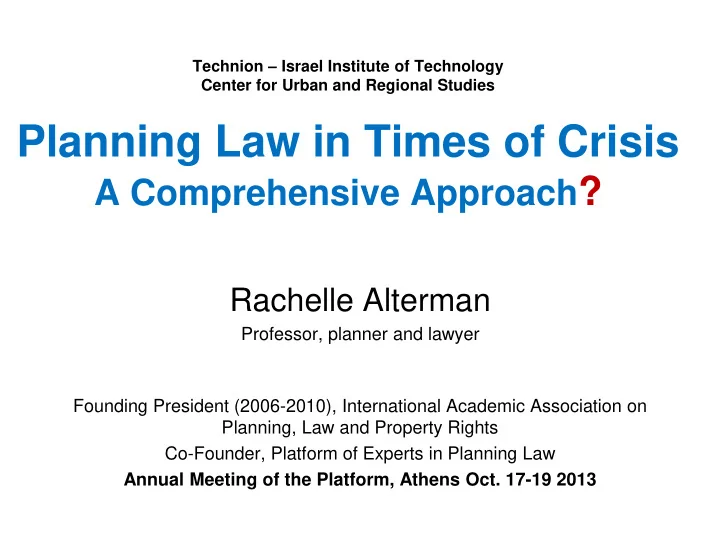

Technion – Israel Institute of Technology Center for Urban and Regional Studies Planning Law in Times of Crisis A Comprehensive Approach ? Rachelle Alterman Professor, planner and lawyer Founding President (2006-2010), International Academic Association on Planning, Law and Property Rights Co-Founder, Platform of Experts in Planning Law Annual Meeting of the Platform, Athens Oct. 17-19 2013
Rachelle Alterman ( 2002 ). Planning in the Face of Crisis . London: Routledge
Attributes of Crisis Situations uncertainty; dependence on exogenous variables high degree of change high magnitude of risks system-wide and complex anticipated impacts poor knowledge about solutions urgency; high cost to delay degree of consensus about goals ??
Crisis situations in the eyes of policy science Policy scientists’ attempts to think of the relationship between types of problems, or situations, and mode of decision making What I have called “Fourth Quadrant Problems”
Planning laws in times of crisis Dimensions for Analyses
Quadrant 1: Administrative and technical problems Decision mode: r ational I "synoptic”) Wars, disasters, crises, grand opportunities Decision mode: Not well understood
Prototypes of policy problems and expectations of government (Christensen 1985;1999: 96) Technology Goal Agreed Non agreed Known A C Programming Bargaining • Predictability • Accommodation of multiple preferences • Equity • Accountability • Efficiency • Effectiveness Unknown B D Experimentation Chaos • Innovation • (Charismatic leader) • Responsiveness • Problem-finder
Policymaking roles categorized by Policy conditions (Christensen 1985;1999: 96) Technology Goal Agreed Non agreed Known A C • Programmer • Advocate • Standardizer • Participation promoter • Rule-setter • Facilitator • Regulator • Mediator • Scheduler • Constitution-writer • Optimizer • Bargainer • Analyst • Administrator Unknown B D • Pragmatist • (Charismatic leader) • Adjuster • problem-finder • Researcher • Social learning promoter • Experimenter • Innovator
Public-policy context and types of policy modes Douglas and Wildavsky 1980 Agreement Knowledge Certain Uncertain A C Problem: information Consent Problem: technical Solution: research Solution: Calculation B D Problem: knowledge Problem: Discontent and content Disagreement Solution: ? Solution: Coercion or Discussion
Phases of Real-Life Decisions in the Face of Crisis PHASE I – SHOCK "A quest for understanding" - institutional numbness - incredulity - scurrying for solutions PHASE II – FOCUSING "In search of the critical path" - sense of overriding urgency - joint sense of mission - quest for alignment PHASE III – ACTION "Time is more than money" - implementation imperatives PHASE IV – PLANNING "Beyond the critical path" - getting recognition for planning - broadening public debate PHASE V - POST-CRISIS MANAGEMENT "Opportunity for macro change"
Types of crisis situations for planning laws Dimensions for Analysis (variables) in order to facilitate Cross-national learning – the purpose of this UNIQUE symposium of our Platform of Experts on Planning Law
General variables Problem type: Bad news or “good news” 1) 2) Unique on national (or local) level or broadly international 3 ) Human / government made or “natural” (is there a “blame game”)? Which agencies are blamed? 4) Was there a relatively similar crisis in the past? Were lessons drawn? 5) Is there (relative) consensus about goals?
Specific planning-related variables Is the planning system a central issue? As “good 6) guy” or “bad guy” (=delays, non enforcement)? 7) Is the planning system highly centralized or decentralized? (whom to blame…) 8) Type of planning-related problem - e.g.: - Fast Growth or slow growth of cities? - housing: prices too low or high? - Employment: too few sites? - Uncontrolled development? - Great deficit in public services? Public unrest? 9) How unique is the situation internationally – capacity for cross-learning 10) Are the expectations realistic ? (probably not!)
Types of (instinctive) solutions - excessive centralization - Bi-pass entirely the planning system – exempt government or certain players to act directly on selected issues (roll back history…) - Excessive decentralization (in name of speeding up the system) - Over-supply of land use that is in crisis - Over-comprises with environmental considerations - Over-protection of certain amenities
So, what can we do? Was this presentation too pessimistic? Share knowledge: There has never been an attempt at systematic cross-national learning on crisis mitigation in planning laws, so let’s give it a try! alterman@technion.ac.il Google: Rachelle Alterman
Recommend
More recommend